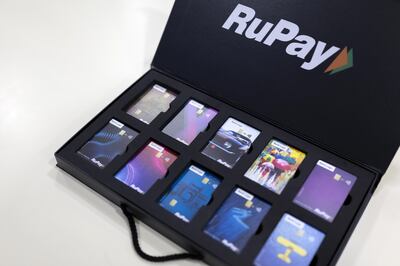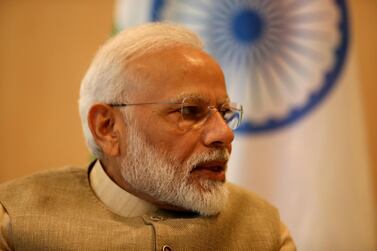Indian Prime Minister Narendra Modi promoted a homegrown Indian payment scheme this weekend during his third official visit to the UAE.
He launched RuPay on Saturday at Emirates Palace in Abu Dhabi, where he was also awarded the Order of Zayed, the UAE’s highest civilian honour.
“The bilateral visit is anchored in the award, but the Prime Minister is also keen on giving a big personal push to the RuPay card,” said Navdeep Suri, India’s ambassador to the UAE.
RuPay is little known outside India, but its surge within the country has challenged the dominance of US giants such as Visa and MasterCard.
The credit and debit cards, whose name blends the words ‘rupee’ and ‘payment’, were launched in India four years ago.
Since then, 500 million people in the country have subscribed to it, and more than half of India’s one billion debit and credit cards now go through the RuPay system.
This surge can be partially credited to Mr Modi, who encouraged use of the indigenous network by saying it serves the country – because the card’s transaction fee is spent towards building roads, schools and hospitals.
Mr Suri said Indian officials will work with UAE authorities, and companies that run point-of-sale machines, to ensure the card is accepted in the Emirates.
This will follow an agreement between payments networks in both countries that will be signed during Mr Modi’s two-day trip.
“It’s become a deep part of our financial inclusion programme in India and now there is keen interest from the Prime Minister to get it global inclusion and acceptance,” Mr Suri said.
By connecting the networks, Indian tourists will be able to use the card when visiting the UAE.
“There are 3 million Indian tourists who come to Dubai alone and they should be able to use the RuPay card whether at Dubai Mall or Abu Dhabi,” Mr Suri said.
There are also plans for UAE banks to issue the cards.
“The aim is to work in a time-bound fashion to have technology tie-ups between the two payments platforms that will enable Indian visitors to use it and UAE-based banks to issue the cards,” he said.
“Just as a Bank of Baroda or Emirates NBD can issue a Mastercard, they should also be able to issue a RuPay card. The next step is to move to mobile-based apps [and] QR payment systems with a unified payment interface.”
Using RuPay will save its users transaction charges including foreign exchange commissions. Its processing fees are also said to be lower.
There has been immediate interest from Indian residents of the UAE.
“I will be the first one to take it in Dubai. I think every Indian passport holder should get this card,” said Ram Buxani, chairman of the ITL Cosmos Group that covers consumer electronics, retail and financial services and board member of the Al Razouki International Exchange Company in Dubai.
“It is positive and will be well used. People invariably use a Visa or MasterCard when they travel, so why will they not use a card that is good for India? There needs to be a lot of information so more people hear of it.”
Abu Muadh is a software professional who works with blue-collar workers and launched a mobile application that delivers educational material.
“Low-income workers are price sensitive and lower fees will be attractive to them. Plus they will trust something coming from their own country,” he said.

“It will be a great idea to target domestic and low-income workers in the UAE. But the main challenge is education, because just giving them a debit card is not enough. They need to understand how to protect themselves from the perils online. It needs to be coupled with teaching them how to use it wisely, how they can save money and benefit from this.”
RuPay was devised to promote financial inclusion and encourage electronic payments in India to effect change in a society that has relied heavily on cash-based transactions.
In UAE, there would be comprehensive talks with His Highness the Crown Prince of Abu Dhabi, Sheikh Mohammed bin Zayed Al Nahyan. The Crown Prince and I would be releasing a stamp to mark Bapu’s 150th Jayanti. The RuPay card will also be launched, which would help many.
— Narendra Modi (@narendramodi) August 22, 2019
Launched in 2014, when the Modi government took office, it has ties to the Bharatiya Janata Party's Jan Dhan Yojana, or People's Wealth Plan, which aims to ensure each household has at least one bank account.
Every Indian citizen opening a bank account for the first time was offered a RuPay debit card under the programme. The scheme included an overdraft facility and a personal accident insurance as part of the federal government’s aim to bring every Indian into a social security net.

He received the Order of Zayed to acknowledge his contribution to boosting closer bilateral ties between the two nations and also released a commemorative Gandhi stamp to mark the 150th anniversary of the activist’s birth.







